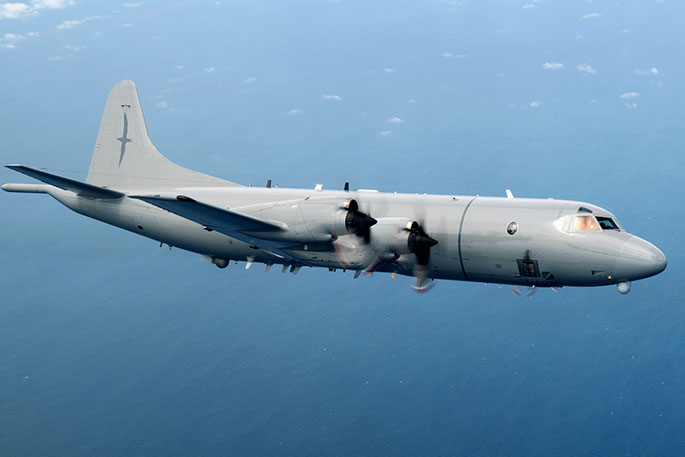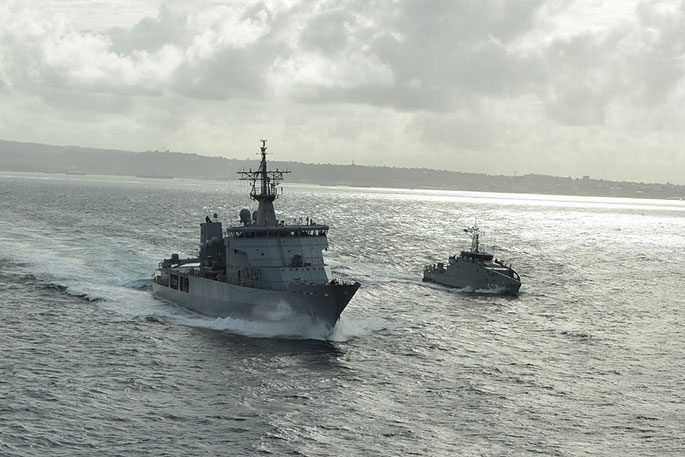New Zealand Defence Force maritime surveillance patrols in partnership with Pacific nations and other agencies are operating well within the new normal of COVID-19 considerations.
Commander Joint Forces New Zealand Rear Admiral Jim Gilmour says the NZDF is continuing maritime surveillance patrols in the Pacific to detect and deter illegal, unreported and unregulated fishing, and other potentially unlawful activity.
Any potential detections are reported to the appropriate authorities for their follow up and action.
Rear Admiral Gilmour says the NZDF is employing a range of methods to ensure the patrols are successfully carried out while also observing distancing procedures with Pacific partners to prevent any potential spread of COVID-19.
The NZDF conducts patrols in cooperation with Pacific nations, National Maritime Coordination Centre, the Ministry for Primary Industries, Pacific Islands Forum Fisheries Agency and other agencies as part of New Zealand's efforts to detect and deter illegal fishing and sustain fisheries for future generations.
Fisheries contribute approximately US$1 billion annually to the economies of Pacific countries and generate about 25,000 jobs. Fisheries revenue is particularly important at the moment due to the significant reduction in tourism revenue for many Pacific Island countries.
With border closures and other restrictions in place as a response to the global COVID-19 pandemic, there have been concerns about illegal fishing activity.
Authorities are warning that unlawful fishing activity will not go undetected.
MPI Director of Compliance Gary Orr says patrols were more important than ever.
'New Zealand contributes to international efforts to monitor the high seas, which are areas of the ocean that fall between countries, for illegal fishing.
"Restrictions in place to manage COVID-19 presented some challenges to that work, but having NZDF being able to undertake targeted and effective maritime surveillance is absolutely key to detecting any IUU fishing."
 Crew on a Royal New Zealand Air Force P-3K2 Orion aircraft have been flying patrols in the Pacific, covering more than 735,000 sq nautical miles recently
Crew on a Royal New Zealand Air Force P-3K2 Orion aircraft have been flying patrols in the Pacific, covering more than 735,000 sq nautical miles recently
Crew on Royal New Zealand Air Force P-3K2 Orion aircraft covered more than 735,000 square nautical miles on Pacific patrols recently, including over the Exclusive Economic Zones of Fiji, Niue, the Cook Islands, the Solomon Islands and high seas pockets, with further patrols to come. Information on vessels of interest during these flights was passed to relevant authorities.
Offshore Patrol Vessel HMNZS OTAGO was recently on patrols with Republic of Fiji Navy ships RFNS Kikau and RFNS Savenca in Fiji's 1.3 million sq km EEZ. A SH-2G(I) Seasprite helicopter on board the ship provided aerial support, in addition to surveillance by the P-3K2.
HMNZS OTAGO Commanding Officer, Commander Fiona Jameson says the ship has successfully carried out a contact-less refuelling and logistics stop in Suva.
'It was fantastic to get alongside Suva and be able to refuel safely in the `new normal' of operations within COVID-19 considerations.
'The opportunity to work with our Pacific partners and build our confidence in working together safely in a Covid environment has been a real success for the ship and the NZDF.
"The aim is to ensure that we are able to support Fiji to monitor their EEZ but also ensure that there is no risk of any Covid transmission between countries. The safety, security and prosperity of the region is important for all of us."
Crew on P-3K2 Orion aircraft overnighted during patrols in the Cook Islands, Niue, and the Solomon Islands.
Health screening of crew, restricted movements on land and compliance with any other requirements by the host nation were among measures put in place to prevent any potential spread of COVID-19.
NZDF support to Pacific nations has also recently included:
- Delivering aid supplies to Vanuatu and Fiji in the wake of Tropical Cyclone Harold
- Assisting with the repatriation of seasonal workers from Vanuatu who were in New Zealand and unable to return home due to border and travel restrictions as a result of the global Covid-19 pandemic;
- Delivery of PPE supplies to the Solomon Islands.



0 comments
Leave a Comment
You must be logged in to make a comment.